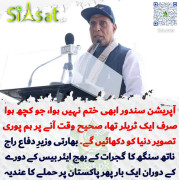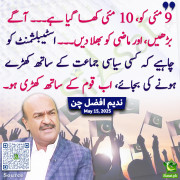Mojo-jojo
Minister (2k+ posts)
Nigeria Has Stopped Polio, WHO Says
Major milestone in global push to eradicate disease

A chid is administered a polio vaccine in Kawo Kano, Nigeria. The WHO on Friday declared Nigeria polio-free. PHOTO: SUNDAY ALAMBA/ASSOCIATED PRESS
Nigeria has successfully stopped transmission of polio in the country, the World Health Organization said Friday, a milestone in a longstanding push to eradicate the disease globally.
Nigeria’s success leaves just two countries—Pakistan and Afghanistan—where transmission of wild poliovirus, the cause of most cases of polio, has never been stopped.
But eliminating the virus from those two countries is enormously challenging, and leaders of the polio eradication effort said Friday that they had pushed back their goal for global eradication by one year, to 2019, and would need to raise $1.5 billion to meet it.
Just three years ago, Nigeria looked like the last place that would eliminate polio, a highly infectious and potentially fatal disease that invades the nervous system and paralyzed 1,000 children a day as late as the 1980s.
Africa’s most populous country recorded more than half of all of the polio cases world-wide in 2012, and polio regularly spilled over its borders. Over nearly a decade, it was the source of cases or outbreaks in 25 countries that had already been declared polio-free.
But pressure from international leaders of the polio-eradication movement led Nigeria’s government to intensify its efforts.
The government, working with international organizations and local leaders, sent more than 200,000 vaccinators to immunize more than 45 million children under 5 years old, used new Global Positioning System mapping technologies to track down children who hadn’t been immunized, and opened emergency-operations centers to manage vaccination campaigns.

ENLARGE
They conducted key vaccination campaigns in some areas of northern Nigeria before Boko Haram arrived and found ways to get vaccinators in and out of areas quickly once the Islamist militant group moved in. They also set up “health camps” offering treatment for common maladies such as malaria and diarrheal diseases along with polio vaccine.
The strategy brought out “children who would otherwise be hidden at home,” said Tunji Funsho, chair of Rotary International’s PolioPlus program in Nigeria. “That changed the game” in some northern Nigerian areas, he said.
As a result, Nigeria hasn’t recorded a case of polio caused by wild poliovirus since July 2014, according to the WHO. And the last recorded case of wild poliovirus in all of Africa occurred in August 2014 in Somalia.
Africa is now on course to be declared polio-free by the WHO if the continent goes three consecutive years without a polio case.
Leaders of the Global Polio Eradication Initiative, a partnership involving governments, the WHO, Rotary International and other organizations, called Nigeria’s success a milestone but cautioned that progress toward eradication is still fragile.
“It is critical that Nigeria goes two more years without a case of polio, which will require the support of partners, increased accountability at all levels of the program led by President [Muhammadu] Buhari, and increased domestic funding commitments,” said Chris Elias, president of global development for the Bill & Melinda Gates Foundation, one of the major funders of the GPEI.
Nigeria’s removal from the shortlist of polio-endemic countries puts pressure on the rest of Africa to prevent further cases, as well as on Pakistan and Afghanistan “to get over the finish line,” said Tom Frieden, director of the Centers for Disease Control and Prevention.
The CDC is one of the GPEI partners and Dr. Frieden is chair of the Polio Oversight Board, which oversees the GPEI.
The GPEI had pledged to wipe out the virus by 2018. But that would have meant that transmission of the virus would have to be stopped by the end of this year, since eradication may be certified by the WHO only three years after the last case.
Halting the virus this year is unlikely, though. So far, 41 cases have been reported: 32 in Pakistan and nine in Afghanistan.
Dr. Frieden said that while stopping polio transmission in those two countries won’t be easy, “We should be able to do it next year.”
Some of the strategies used in Nigeria are now being implemented in Pakistan, such as emergency operations centers and health camps, polio leaders said. But violence against vaccinators remains a serious obstacle and Pakistan and Afghanistan need to work closely together, they said.
“What we’ve seen in Pakistan over the last year is real improvement in performance,” said Dr. Frieden. “You’ve got better surveillance, in some ways a better response. You’ve got fewer children who are inaccessible.”
But more needs to be done, particularly in Afghanistan, where there is substantial cross-border movement, Dr. Frieden said. “They need to each of them do a better job at cross-border stuff,” he said.
Source
Major milestone in global push to eradicate disease

A chid is administered a polio vaccine in Kawo Kano, Nigeria. The WHO on Friday declared Nigeria polio-free. PHOTO: SUNDAY ALAMBA/ASSOCIATED PRESS
Nigeria has successfully stopped transmission of polio in the country, the World Health Organization said Friday, a milestone in a longstanding push to eradicate the disease globally.
Nigeria’s success leaves just two countries—Pakistan and Afghanistan—where transmission of wild poliovirus, the cause of most cases of polio, has never been stopped.
But eliminating the virus from those two countries is enormously challenging, and leaders of the polio eradication effort said Friday that they had pushed back their goal for global eradication by one year, to 2019, and would need to raise $1.5 billion to meet it.
Just three years ago, Nigeria looked like the last place that would eliminate polio, a highly infectious and potentially fatal disease that invades the nervous system and paralyzed 1,000 children a day as late as the 1980s.
Africa’s most populous country recorded more than half of all of the polio cases world-wide in 2012, and polio regularly spilled over its borders. Over nearly a decade, it was the source of cases or outbreaks in 25 countries that had already been declared polio-free.
But pressure from international leaders of the polio-eradication movement led Nigeria’s government to intensify its efforts.
The government, working with international organizations and local leaders, sent more than 200,000 vaccinators to immunize more than 45 million children under 5 years old, used new Global Positioning System mapping technologies to track down children who hadn’t been immunized, and opened emergency-operations centers to manage vaccination campaigns.

ENLARGE
They conducted key vaccination campaigns in some areas of northern Nigeria before Boko Haram arrived and found ways to get vaccinators in and out of areas quickly once the Islamist militant group moved in. They also set up “health camps” offering treatment for common maladies such as malaria and diarrheal diseases along with polio vaccine.
The strategy brought out “children who would otherwise be hidden at home,” said Tunji Funsho, chair of Rotary International’s PolioPlus program in Nigeria. “That changed the game” in some northern Nigerian areas, he said.
As a result, Nigeria hasn’t recorded a case of polio caused by wild poliovirus since July 2014, according to the WHO. And the last recorded case of wild poliovirus in all of Africa occurred in August 2014 in Somalia.
Africa is now on course to be declared polio-free by the WHO if the continent goes three consecutive years without a polio case.
Leaders of the Global Polio Eradication Initiative, a partnership involving governments, the WHO, Rotary International and other organizations, called Nigeria’s success a milestone but cautioned that progress toward eradication is still fragile.
“It is critical that Nigeria goes two more years without a case of polio, which will require the support of partners, increased accountability at all levels of the program led by President [Muhammadu] Buhari, and increased domestic funding commitments,” said Chris Elias, president of global development for the Bill & Melinda Gates Foundation, one of the major funders of the GPEI.
Nigeria’s removal from the shortlist of polio-endemic countries puts pressure on the rest of Africa to prevent further cases, as well as on Pakistan and Afghanistan “to get over the finish line,” said Tom Frieden, director of the Centers for Disease Control and Prevention.
The CDC is one of the GPEI partners and Dr. Frieden is chair of the Polio Oversight Board, which oversees the GPEI.
The GPEI had pledged to wipe out the virus by 2018. But that would have meant that transmission of the virus would have to be stopped by the end of this year, since eradication may be certified by the WHO only three years after the last case.
Halting the virus this year is unlikely, though. So far, 41 cases have been reported: 32 in Pakistan and nine in Afghanistan.
Dr. Frieden said that while stopping polio transmission in those two countries won’t be easy, “We should be able to do it next year.”
Some of the strategies used in Nigeria are now being implemented in Pakistan, such as emergency operations centers and health camps, polio leaders said. But violence against vaccinators remains a serious obstacle and Pakistan and Afghanistan need to work closely together, they said.
“What we’ve seen in Pakistan over the last year is real improvement in performance,” said Dr. Frieden. “You’ve got better surveillance, in some ways a better response. You’ve got fewer children who are inaccessible.”
But more needs to be done, particularly in Afghanistan, where there is substantial cross-border movement, Dr. Frieden said. “They need to each of them do a better job at cross-border stuff,” he said.
Source
Last edited by a moderator:

























